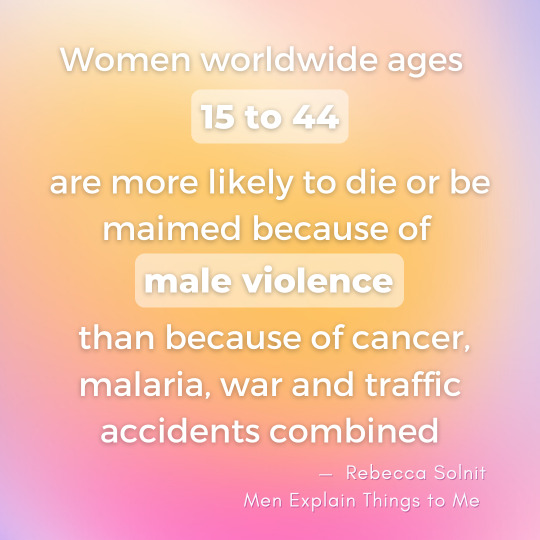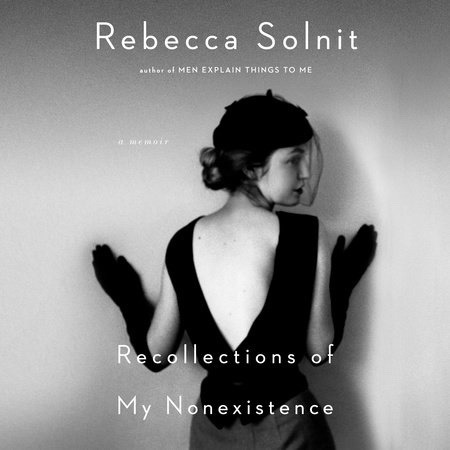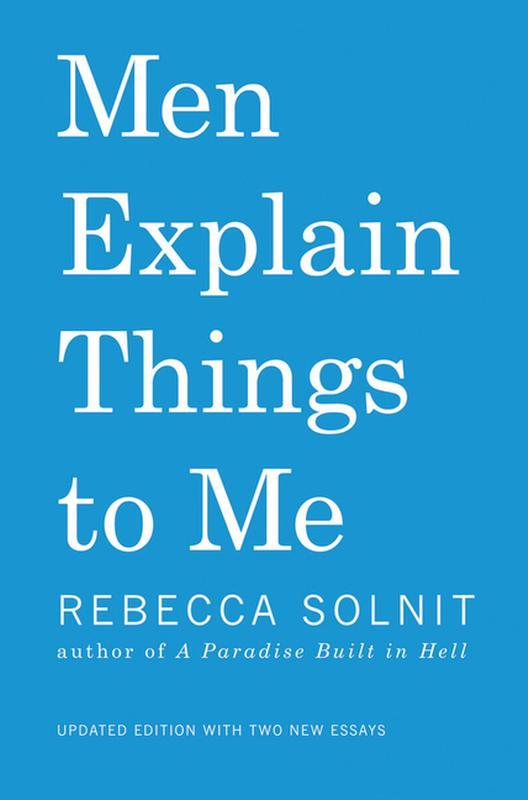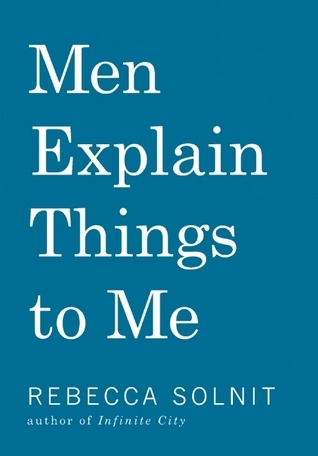#men explain things to me
Text

#gender abolition#w4w post#w4w infographic#stats#feminism#feminist#quotes#rebecca solnit#men explain things to me
739 notes
·
View notes
Text


Bitirmeme 20 sayfa kaldı. Bence harikulade bir deneme. İsmi bazı erkekler için ofansif gelebilir ama gayet sakin ve "vanilla" bir tavrı var yazarın. Hem kadınlara uygulanan sistemli haksızlığı anlatıyor hem de kadın özgürlüğünün erkek düşmanlığı olmadığını, bunun bir savaş olmadığını derli toplu biçimde anlatıyor. Farklı ülkelerden örneklerleriyle ve geleceğe yönelik iyimser tutumuyla okunması gereken bir kitap bence. Ayrıca "mansplaining" kavramının çıkış noktası da yazarın başından geçen bir olay, kitapta da anlatılıyor.
Not: ben karamsar birisi olarak bi tık fazla iyimser buldum, orası ayrı.
Bizdeki kapak hiç estetik değil bu arada :')
#ucurumdaki#kitap önerisi#bana bilgiçlik taslayan adamlar#men explain things to me#feminism#feminist books#rebecca solnit
7 notes
·
View notes
Text
Some women get erased a little at a time, some all at once. Some reappear. Every woman who appears wrestles with the forces that would have her disappear. She struggles with the forces that would tell her story for her, or write her out of the story, the genealogy, the rights of man, the rule of law. The ability to tell your own story, in words or images, is already a victory, already a revolt.
Rebecca Solnit
Men Explain Things to Me
7 notes
·
View notes
Photo

"To have a voice means not just the animal capacity to utter sounds but the ability to participate fully in the conversations that shape your society, your relations to others, and your own life. There are three key things that matter in having a voice: audibility, credibility, and consequence."
* * * *
The crucial sentence in “Men Explain Things to Me” is “credibility is a basic survival tool.” But I was wrong that it’s a tool. You hold a tool in your own hands, and you use it yourself. What it does is up to you. Your credibility arises in part from how your society perceives people like you, and we have seen over and over again that no matter how credible some women are by supposedly objective standards reinforced by evidence and witnesses and well-documented patterns, they will not be believed by people committed to protecting men and their privileges. The very definition of women under patriarchy is designed to justify inequality, including inequality of credibility.
Though patriarchy often claims a monopoly on rationality and reason, those committed to it will discount the most verifiable, coherent, ordinary story told by a woman and accept any fantastical account by a man, will pretend sexual violence is rare and false accusations common, and so forth. Why tell stories if they will only bring forth a new round of punishment or disparagement? Or if they will be ignored as if they meant nothing? This is how preemptive silencing works.
To have a voice means not just the animal capacity to utter sounds but the ability to participate fully in the conversations that shape your society, your relations to others, and your own life. There are three key things that matter in having a voice: audibility, credibility, and consequence.
Audibility means that you can be heard, that you have not been pressed into silence or kept out of the arenas in which you can speak or write (or denied the education to do so—or, in the age of social media, harassed and threatened and driven off the platform, as so many have).
Credibility means that when you get into those arenas, people are willing to believe you, by which I don’t mean that women never lie, but that stories should be measured on their own terms and context, rather than patriarchy’s insistence that women are categorically unqualified to speak, emotional rather than rational, vindictive, incoherent, delusional, manipulative, unfit to be heeded—those things often shouted over a woman in the process of saying something challenging (though now death threats are used as a shortcut, and some of those threats are carried out, notably with women who leave their abusers, because silencing can be conversational or it can be premeditated murder).
To be a person of consequence is to matter. If you matter, you have rights, and your words serve those rights and give you the power to bear witness, make agreements, set boundaries. If you have consequence, your words possess the authority to determine what does and does not happen to you, the power that underlies the concept of consent as part of equality and self-determination.
Even legally women’s words have lacked consequence: in only a few scattered places on earth could women vote before the twentieth century, and not so many decades ago, women rarely became lawyers and judges; I met a Texas woman whose mother was among the first in their region to serve on a jury, and I was an adult when the first woman was appointed to the U.S. Supreme Court.
Until a few decades ago, wives throughout much of the world, including the United States, lacked the right to make contracts and financial decisions or even to exercise jurisdiction over their own bodies that overrode their husbands’ ability to do so; in some parts of the world, a wife is still property under the law, and others choose her husband. To be a person of no consequence, to speak without power, is a bewilderingly awful condition, as though you were a ghost, a beast, as though words died in your mouth, as though sound no longer traveled. It is almost worse to say something and have it not matter than to be silent.
Gender violence is made possible by this lack of audibility, credibility, and consequence. We live inside an enormous contradiction: a society that by law and preening self-regard insists it is against such violence has by innumerable strategies allowed that violence to continue unchecked, better and far more frequently protected perpetrators than victims, and routinely punished, humiliated, and intimidated victims for speaking up, from workplace harassment cases to campus rape cases to domestic violence cases. The result makes crimes invisible and victims inaudible people of no consequence.
The disregard for a woman’s voices that underlies sexual violence is inseparable from the disregard afterward if a woman goes to the police, the university authorities, her family, her church, the courts, to the hospital for a rape kit, and is ignored, discredited, blamed, shamed, disbelieved. They are both assaults on the full humanity and membership of a person in her society, and the devaluation in the latter arena enables the former. Sexual assault can only thrive in situations of unequal audibility, credibility, and consequence. This, far more than any other disparity, is the precondition for epidemic gender violence.
Changing who has a voice with all its powers and attributes doesn’t fix everything, but it changes the rules, notably the rules about what stories will be told and heard and who decides. One of the measures of this change is the many cases that were ignored, disbelieved, dismissed, or found in favor of the perpetrator years ago that have had a different outcome in the present, because the women or children who testified have more audibility, credibility, and consequence now than they did before. The impact of this epochal shift that will be hardest to measure will be all the crimes that won’t happen because the rules have changed.
--from Recollections of My Nonexistence
Rebecca Solnit
#women#quotes#articles#books#Men Explain Things To Me#Rebecca Solnit#Recollections of My Nonexistence#gender violence
26 notes
·
View notes
Photo

Amber Heard, (Instagram, October 14, 2018)
—Hey Ladies!: The Story of 8 Best Friends, 1 Year, and Way, Way Too Many Emails, Michelle Markowitz, Caroline Moss (2018)
—Men Explain Things to Me, Rebecca Solnit (2014)
—White Fragility: Why It’s So Hard for White People to Talk About Racism, Robin DiAngelo (2018)
#amber heard#hey ladies!#Hey Ladies!: The Story of 8 Best Friends 1 Year and Way Way Too Many Emails#Michelle Markowitz#Caroline Moss#Men Explain Things to Me#Rebecca Solnit#white fragility#White Fragility: Why It’s So Hard for White People to Talk About Racism#Robin DiAngelo#books#celebrities
14 notes
·
View notes
Text
Spiderwebs are images of the non-linear, of the many directions in which something might go, the many sources for it; of the grandmothers as well as the strings of begats. There’s a German painting from the nineteenth century of women processing the flax from which linen is made. They wear wooden shoes, dark dresses, demure white caps, and stand at various distances from a wall, where the hanks of raw material are being wound up as thread. From each of them, a single thread extends across the room, as though they were spiders, as though it came right out of their bellies. Or as though they were tethered to the wall by the fine, slim threads that are invisible in other kinds of light. They are spinning, they are caught in the web. To spin the web and not be caught in it, to create the world, to create your own life, to rule your fate, to name the grandmothers as well as the fathers, to draw nets and not just straight lines, to be a maker as well as a cleaner, to be able to sing and not be silenced, to take down the veil and appear: all these are the banners on the laundry line I hang out.
Rebecca Solnit, Men Explain Things to Me
#rebecca solnit#men explain things to me#books#essays#quotes#morningread#SHE IS SOOOOO I LOVE HER BRAIN!!
21 notes
·
View notes
Text
The out-and-out confrontational confidence of the totally ignorant is, in my experience, gendered. Men explain things to me, and other women, whether or not they know what they're talking about.
Solnit, R. (2014). Men explain things to me.
2 notes
·
View notes
Text

Book List, 2023
Convenience Store Women by Sayaka Murata
I Want To Die but I Want to Eat Tteokbokki by Baek Sehee
Women Don't Owe You Pretty by Florence Given
I really want to read more feminism books so if you have any recommendations please share them with me. It'll be greatly appreciated.
No Longer Human Osamu Dazai
I remember a lot of people talking about this book and author in 2020 and I want to finally read it 3 years later....
Schoolgirl by Osamu Dazai
Hood Feminism by Mikki Kendall
Men Explain Things to Me by Rebecca Solnit
Un-Told Night And Day by Bae Suah
Before the coffee gets cold by Toshikazu Kawaguchi
Asleep by Banana Yoshimoto
Goodbye Tsugumi by Banana Yoshimoto
Breasts And Eggs by Mieko Kawakami
All The lovers In The Night by Mieko Kawakami
Heaven by Mieko Kawakami, I'm currently reading this one but I'm not that far along so I added it here.
Please send me book recommendations!! I might procrastinate them but it's better to have them than not know what to read next :)
This is the song I was listening to while writing this post.
#book blog#heavenisblue#heavenbymieokokawakami#all the lovers in the night#breasts and eggs#convenience store woman#i want to die but i want to eat tteokbokki#men Explain Things to Me#women dont owe you pretty#hood feminism#before the coffee gets cold#no longer human#books and reading#books#bookaholic#book list#booknerd#muisc#feminism#book rambles#book recommendations#book rec request#Spotify
6 notes
·
View notes
Text

#Currently reading#bookblr#readerblr#feminism#feminist#men explain things to me#Men explain things to me Rebecca Solnit
2 notes
·
View notes
Text
Even getting a restraining order—a fairly new legal tool—requires acquiring the credibility to convince the courts that some guy is a menace and then getting the cops to enforce it. Restraining orders often don’t work anyway. Violence is one way to silence people, to deny their voice and their credibility, to assert your right to control over their right to exist. About three women a day are murdered by spouses or ex-spouses in this country. It’s one of the main causes of death for pregnant women in the United States. At the heart of the struggle of feminism to give rape, date rape, marital rape, domestic violence, and workplace sexual harassment legal standing as crimes has been the necessity of making women credible and audible.
Men Explain Things to Me - Rebecca Solnit
#Men Explain Things to Me#Rebecca Solnit#feminism#feminist#intersectional feminism#equality#equal rights#intersectionality#woman empowermen#reading#atypicalreads#womanhood#activism#cw violence#violence against women#womens rights#nsnv#reproductive justice#pro choice#gender studies#cw rape mention#autonomy#women's history month#social progress#social evolution#women's liberation#booklr
4 notes
·
View notes
Text

179 notes
·
View notes
Text
Review “Men Explained Things to Me”

Just some random thoughts I had while reading the book:
1. Solnit was so pissed with the so-called everlasting knowledge that the men try to represent they have. Literally in every matter, they try to put forward some illogical, unreasonable and irrelevant garbage of the theories they posses and try to stop the women, violating the rights to speak laws everyday.
2. It has become a necessity to start talking about women and their rights by stating about their unprivileged condition first. Many people may find this as cliché or rather boring, but just think about it in this way, we guys might have become bored to hear about these regular women tragedy everyday where this shitty condition of women is not changing for these whole periods of times those had finally made you bored!
3. I loved how Solnit talked about the violence women are facing in her country as well as tried to talk about some of the problems of India. Some of her quotations are very very strong. She has a great political as well as philosophical views. She wasn't confined in talking about feminisms and women's problems only but also shared her perspectives as a writer in different artistic values.
4. In one of her essays, she also mentioned that time is definitely changing though. Women are suffering true, but not as much as they used to in the past. I think writing this is definitely an example of optimism which again gives us hope (the famous Pandora's box's hope in the good sense you know). The essay called "Pandora's box and volunteer police force" and "Thinking out of the box" are my absolute favorite.
5. In her essays she also talked about some other issues like capitalism etc. which shows her other sides like unbiases.
#men explain things to me#essay#book review#books reading#booklog#booklr#books#Books and Literature#feminist#feminism#books about writing#books & libraries#bookblr
4 notes
·
View notes
Text
“Every woman knows what I'm talking about. It’s the presumption that makes it hard, at times, for any woman in any field; that keeps women from speaking up and from being heard when they dare; that crushes young women into silence by indicating, the way harassment on the street does, that this is not their world. It trains us in self-doubt and self-limitation just as it exercises men’s unsupported overconfidence.”
― Rebecca Solnit ❤
2 notes
·
View notes
Photo

Natalie Portman, (Elle 2021 Interview)
—Men Explain Things to Me, Rebecca Solnit (2014)
1 note
·
View note
Text
And they’re out to gut reproductive rights—birth control as well as abortion, as they’ve pretty effectively done in many states over the last dozen years. What’s meant by “reproductive rights,” of course, is the right of women to control their own bodies. Didn’t I mention earlier that violence against women is a control issue?
Rebecca Solnit, Men Explain Things To Me
17 notes
·
View notes
Text

i was asked to give connor this and here we are
#dbh connor#dbh#detroit become human#hank anderson#i'm sorry i can't draw hot men but i'm trying rly rly#thanks for the idea more excuses to draw connor#i freaking love bryan's face he's so pretty and yet so like regular looking idk how to explain but he's so pretty#but also looking like a regular guy you could meet everyday#i have no idea how to draw him i tried many times and he's impossible#idk i hate pretty men they make me feel things bc what are you pretty for#lol
2K notes
·
View notes